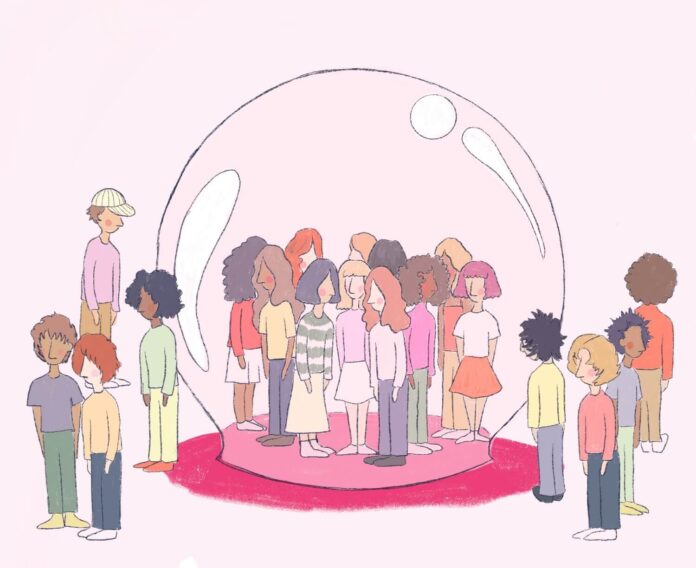I don’t think I realized that my seven years of all-girls school had impacted me in any formative or traumatic way until I stepped onto Occidental’s campus during orientation week.
I’m not trying to dramatize anything, but after only several hours on campus —in fact minutes into my O-team experience— I had gravely misjudged what the “real world” was like, and I realized I would be learning through experience from now on.
In a nationally first ranked district, Castilleja (Casti) advertised itself as a school with a unique educational experience for women and gender non-conforming people, an education that competed with other top-tier schools in the country. From my understanding, Casti’s mission was to empower young girls to be powerful women in the workforce and the world, to view ourselves as equal to men in terms of capability and opportunity.
The major difference between Castilleja School and Oxy — besides the lack of a uniform — was one thing: men.
Learning about and experiencing the patriarchy are two completely different things that I’m not sure my school was aware of, or tried hard enough to warn us about what it would be like. At Casti, my classmates and I were endlessly bombarded with feminist ideology and activism. Unlike some of my classmates, even outside of school, I didn’t find myself in environments with boys or men my age, so I was pretty insulated against what it was like to live in a co-ed world.
Our slogan, “Women learning, women leading” turned into a joke that my friends and I would mock 24/7. Now I think about that statement and sometimes wish I was back in that community.
Men take up space in a unique way that I was completely unprepared for. I hate the way the men around me feel entitled to interrupt conversations and distract discussions — I hate the way everyone gives them second chances, how our society or even Oxy’s community vilifies us the second we make a mistake, and doesn’t give us the grace to make a mistake.
Even in my first-year seminar, one of the first classes I had taken at Oxy, I felt that the classroom was overwhelmingly dominated by men and male ego. Most of the time, only men would talk, and they weren’t afraid to ask questions that either took at least five minutes to answer or entirely deviated from the lesson plan. I noticed things very quickly, like how men are not aware of the physical space they take up. How they can make one lame joke and suddenly they’re a comedian. It made me annoyed to see how things seem to come more easily for men.
These feelings made me very anxious and uncomfortable, and looking back, I can see how the drastic change in my environment caused me inner turmoil, doubt, frustration and anger. I became super aware of my own presence and tried to take up as much space as I could while being very anti-patriarchy.
During my first semester at Oxy, I started thinking a lot more about how I was perceived by men, whether that be by looks, personality, basically in any facet, and I really didn’t like the way it made me feel. I hated how I felt I was being ignored, viewed as inadequate, and not taken seriously in professional settings. My lack of exposure to men for so long made me not afraid, but cautious around them.
I also started thinking a lot about myself and how I act differently around men and why I do so. At Casti, I was outspoken and eager to participate in the classroom. At Oxy, it took me a second to feel comfortable enough to speak up in spaces dominated by men. When I started Casti in the fifth grade, I had expected that it would take me years to get used to no boys, but I was surprised to have acclimated after just one day. I guess that made me think the transition back would be easier. It wasn’t.
I knew I was at Casti to learn how to be confident, and how not to be afraid to ask questions or critique something. I was able to grow and foster relationships with women and gender non-conforming people. After seven years of being empowered, I was shocked at how hard it was to actually live in the co-ed world.
I must acknowledge that this experience is very specific to me, and I have friends from high school that have had no problems interacting with or being around men. But, I don’t think it would be an exaggeration to say I rarely even saw men my age. As much as I have met great guys on campus who are aware of their privilege and are cool to talk to, I often consider how much their presence impacts my daily life.
Maybe my memory is just aestheticizing and romanticizing my experiences at Casti. It’s important to speak to the experience of transitioning from a very sheltered bubble to being around people you are not used to and don’t necessarily understand. If I had been more prepared to encounter and have to interact with men, maybe that transition would not have been as difficult and overwhelming. Casti should address how transitioning from an all-girls environment to a co-ed one can be a significant change for some who don’t spend time with men in their daily lives.
A part of me is a little sad to admit that Casti’s mission of female empowerment wasn’t as impactful as I thought it would be, but I also realize it is impossible to be truly prepared for existing in this world as a woman. While Casti has prepared me for college academically, I had to learn on my own how the real world views me.
Contact Sela Dingpontsawa at dingpontsawa@oxy.edu.
![]()































